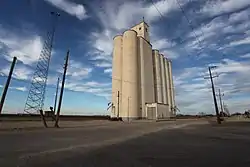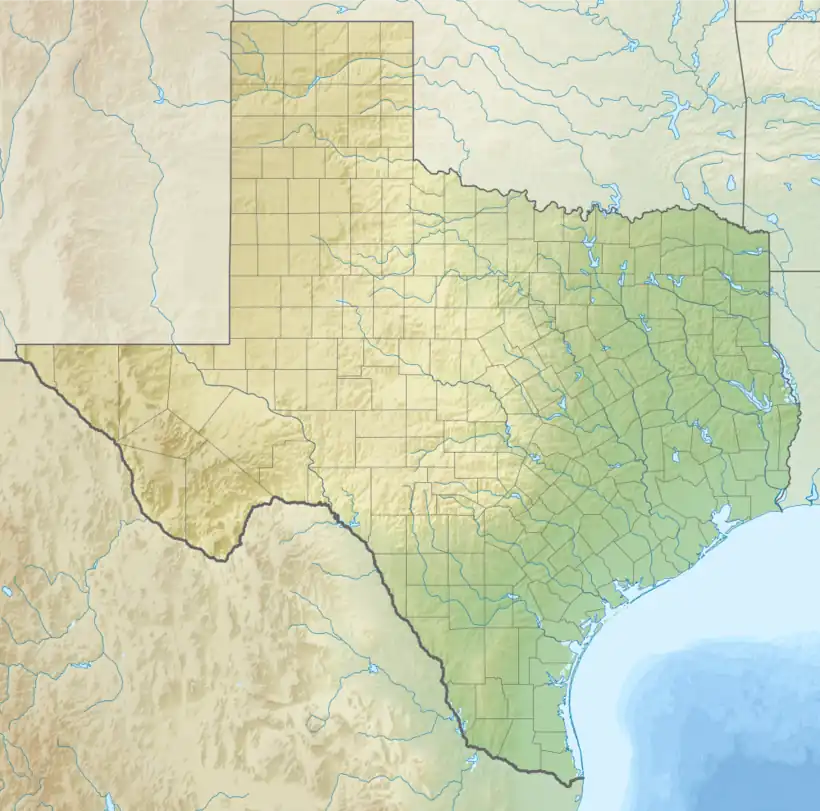Roscoe, Texas | |
|---|---|
 Plowboy grain elevator in Roscoe | |
 Roscoe | |
| Coordinates: 32°26′45″N 100°32′19″W / 32.44583°N 100.53861°W[1] | |
| Country | United States |
| State | Texas |
| County | Nolan |
| Region | West Texas |
| Established | 1890 |
| Area | |
| • Total | 3.22 sq mi (8.35 km2) |
| • Land | 3.22 sq mi (8.35 km2) |
| • Water | 0.00 sq mi (0.00 km2) |
| Elevation | 2,388 ft (728 m) |
| Population | |
| • Total | 1,322 |
| • Estimate (2019)[4] | 1,285 |
| • Density | 398.70/sq mi (153.93/km2) |
| Time zone | UTC-6 (CST) |
| ZIP code | 79545 |
| Area code | 325 |
| FIPS code | 48-63176 |
| Website | http://roscoetx.com/ |
Roscoe is a city in Nolan County in the U.S. state of Texas near the intersection of Interstate 20 and US Highway 84. The Union Pacific Railroad passes through the center of the city.[5]
Geography
According to the United States Census Bureau, the city has a total area of 1.9 square miles (4.9 km2), all land. The population was 1,378 at the 2000 census, but has since decreased to only approximately 900.Need Citation, Disagrees with Side Bar - History
Climate
According to the Köppen climate classification system, Roscoe has a semiarid climate, BSk on climate maps.[6]
History
Originally named Vista for an official of the Texas and Pacific Railway which passed through the town, Roscoe took its present name with the opening of the post office in 1890. The town was incorporated in 1907. Shipment of cattle by railroad featured prominently in the town's early economic history, and the Roscoe, Snyder, and Pacific Railway connected the town to the Santa Fe Railway in nearby Fluvanna in 1909.[7][8]
A post office has been in operation at Roscoe since 1890.[9]
Demographics
| Census | Pop. | Note | %± |
|---|---|---|---|
| 1910 | 941 | — | |
| 1920 | 1,079 | 14.7% | |
| 1930 | 1,250 | 15.8% | |
| 1940 | 1,166 | −6.7% | |
| 1950 | 1,584 | 35.8% | |
| 1960 | 1,490 | −5.9% | |
| 1970 | 1,580 | 6.0% | |
| 1980 | 1,628 | 3.0% | |
| 1990 | 1,446 | −11.2% | |
| 2000 | 1,378 | −4.7% | |
| 2010 | 1,322 | −4.1% | |
| 2019 (est.) | 1,285 | [4] | −2.8% |
| U.S. Decennial Census[10] | |||
2020 census
| Race | Number | Percentage |
|---|---|---|
| White (NH) | 606 | 47.68% |
| Black or African American (NH) | 16 | 1.26% |
| Native American or Alaska Native (NH) | 8 | 0.63% |
| Asian (NH) | 4 | 0.31% |
| Some Other Race (NH) | 9 | 0.71% |
| Mixed/Multi-Racial (NH) | 19 | 1.49% |
| Hispanic or Latino | 609 | 47.92% |
| Total | 1,271 |
As of the 2020 United States census, there were 1,271 people, 565 households, and 450 families residing in the city.
2000 census
As of the census[14] of 2000, 1,380 people, 509 households, and 382 families resided in the city. The population density was 728.1 inhabitants per square mile (281.1/km2). The 588 housing units averaged 310.7/sq mi (120.1/km2). The racial makeup of the city were 75.18% White, 1.09% African American, 0.44% Native American, 0.15% Asian, 20.17% from other races, and 2.98% from two or more races. Hispanics or Latinos of any race were 36.94% of the population.
Of 509 households, 32.6% had children under the age of 18 living with them, 61.5% were married couples living together, 10.2% had a female householder with no husband present, and 24.8% were not families. About 22.8% of all households were made up of individuals, and 13.0% had someone living alone who was 65 years of age or older. The average household size was 2.63 and the average family size was 3.09.
In the town, the population was distributed as 28.2% under the age of 18, 6.9% from 18 to 24, 23.3% from 25 to 44, 22.3% from 45 to 64, and 19.3% who were 65 years of age or older. The median age was 38 years. For every 100 females, there were 89.8 males. For every 100 females age 18 and over, there were 90.6 males.
The median income for a household in the city was $23,816, and for a family was $28,393. Males had a median income of $25,313 versus $20,000 for females. The per capita income for the city was $11,792. About 20.6% of families and 25.2% of the population were below the poverty line, including 34.9% of those under age 18 and 17.1% of those age 65 or over.
Economy
The Roscoe Wind Farm, owned and operated by E.ON Climate and Renewables, is one of the world's largest capacity wind farms with 627 wind turbines and a total installed capacity of 781.5 MW.[15] At the time of its completion, it was the largest wind farm in the world, surpassing the nearby 735.5-MW Horse Hollow Wind Energy Center. In 2012, it was overtaken by California's 1,020-MW Alta Wind Energy Center. The project cost more than $1 billion and provides enough power for more than 250,000 average Texan homes. A landowner can earn between $500 and $1,000 per windmill per year.[16]
Arts and culture
Roscoe is home to the Plowboy Mudbog which is held twice a year, during the Independence Day Celebration, which is held on July 4 weekend, and in October, usually coinciding with the Wind Festival. The July mudbog normally draws around 70 to 80 trucks competing for prize and bragging rights.
Education
The City of Roscoe is served by Roscoe Collegiate Independent School District. The recent wind development in the area has enabled Roscoe ISD to update its aging facilities built in the era of the Works Progress Administration. Since the 2012–13 school year, all of the district's students have been in new or updated buildings. Roscoe Collegiate ISD operates one of 50 Early College High Schools in Texas in partnership with Western Texas College in Snyder. Students of Roscoe Collegiate High School have the ability to earn an associate degree from Western Texas College at the time of high school graduation. The mascot of Roscoe Collegiate High School is the Plowboys.
Transportation
In addition to the Union Pacific, another rail line, the Roscoe, Snyder and Pacific Railway (RS&P), formerly extended 50 miles (80 km) from Roscoe to Fluvanna, passing through Snyder. Built in 1908, the railway served as a bridge between the Atchison, Topeka and Santa Fe Railway in Snyder and the then-Texas and Pacific Railway in Roscoe. Although the RS&P became one of the most profitable short lines in the nation during its early years, passenger service was discontinued in 1953, freight service was discontinued in the late 1970s, and most of the tracks outside of the city had been removed by 1984.[5]
Notable person
- J. J. Pickle, U.S. congressman
See also
References
- 1 2 "Roscoe". Geographic Names Information System. United States Geological Survey, United States Department of the Interior.
- ↑ "2019 U.S. Gazetteer Files". United States Census Bureau. Retrieved August 7, 2020.
- ↑ "US Gazetteer files: 2010, 2000, and 1990". United States Census Bureau. February 12, 2011. Retrieved April 23, 2011.
- 1 2 "Population and Housing Unit Estimates". United States Census Bureau. May 24, 2020. Retrieved May 27, 2020.
- 1 2 William R. Hunt, " Roscoe, TX," Handbook of Texas Online, https://tshaonline.org/handbook/online/articles/hjr13, accessed January 15, 2012, Published by the Texas State Historical Association.
- ↑ Climate Summary for Roscoe, Texas
- ↑ E. L. Yeats and Hooper Shelton, History of Nolan County (Sweetwater, Texas: Shelton, 1975).
- ↑ Hunt, William. "Roscoe, TX".
- ↑ "Postmasters by city".
- ↑ "Census of Population and Housing". Census.gov. Retrieved June 4, 2015.
- ↑ "Explore Census Data". data.census.gov. Retrieved May 19, 2022.
- ↑ https://www.census.gov/
- ↑ "About the Hispanic Population and its Origin". www.census.gov. Retrieved May 18, 2022.
- ↑ "U.S. Census website". United States Census Bureau. Retrieved January 31, 2008.
- ↑ Weise, Elizabeth; Jervis, Rick. "Turbines to the max: Texas produces more wind energy than nearly anywhere else in the world". USA TODAY. Retrieved October 19, 2019.
- ↑ Window of Change Blow into Roscoe, Texas, John Burnett, NPR, November 27, 2007.
